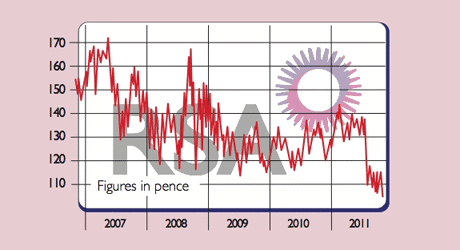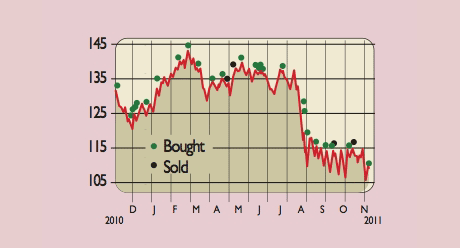Shares in focus: Is the sun setting on insurance giant RSA?
RSA has been hit by catastrophes, but can the insurance giant stage a recovery? Phil Oakley investigates.
Get the latest financial news, insights and expert analysis from our award-winning MoneyWeek team, to help you understand what really matters when it comes to your finances.
You are now subscribed
Your newsletter sign-up was successful
Want to add more newsletters?

Twice daily
MoneyWeek
Get the latest financial news, insights and expert analysis from our award-winning MoneyWeek team, to help you understand what really matters when it comes to your finances.

Four times a week
Look After My Bills
Sign up to our free money-saving newsletter, filled with the latest news and expert advice to help you find the best tips and deals for managing your bills. Start saving today!
What is RSA?
RSA Insurance Group (RSA) sells car, house, travel and pet insurance to consumers in Britain under the MORE TH>N brand and via insurance brokers and partners such as banks, motor manufacturers and retailers. It also sells general insurance to companies, particularly specialist cover in areas such as marine, construction and engineering and renewable energy. RSA has direct operations in 36 countries. A partner network gives it a presence in more than 150 countries.
What is the company's history?
RSA's roots go back to 1710 when the Sun Fire Office was established. In 1959, the Sun Insurance Office merged with the Alliance Insurance Company to form Sun Alliance Limited. Royal Insurance and Sun Alliance merged in 1996. The late 1990s and early 2000s were difficult due to strong competition and weak investment markets.
By 2003, the company had slashed its dividend payment and tapped its shareholders for nearly £1bn of fresh equity. A new management team revitalised the business by cutting costs, selling problem businesses and building a presence in emerging markets. During the last five years, a disciplined, low-risk investment approach has meant the insurance business has been consistently profitable.
MoneyWeek
Subscribe to MoneyWeek today and get your first six magazine issues absolutely FREE

Sign up to Money Morning
Don't miss the latest investment and personal finances news, market analysis, plus money-saving tips with our free twice-daily newsletter
Don't miss the latest investment and personal finances news, market analysis, plus money-saving tips with our free twice-daily newsletter
Who runs it?
Simon Lee moved from being head of the international business to become group chief executive on 1 November. His total pay was £935,000 in 2010. George Culmer is chief financial officer. John Napier is chairman.
How's trading?
Net premium income for the nine months to 30 September increased by 11% to £6.1bn on the back of rate increases and previous acquisitions. Strong performances were seen in Canada, Ireland, UK pet and home insurance and in Latin America. The value of RSA's low-risk investment portfolio remained steady at £14.4bn. Of the fund, 89% is invested in high-quality fixed-income securities (with less than 1% in eurozone government bonds). RSA had £1.3bn in surplus capital twice its regulatory requirement.
What's the outlook?
Despite exposure to several global catastrophes caused by bad weather, RSA should grow profits and dividends in 2011. Strong growth in insurance premiums is expected to generate higher underwriting profits in 2011. Investment income should be similar to 2010. The European Union's solvency framework remains a headwind. If RSA is told to raise more capital to reduce financial risk, returns to shareholders could be reduced.
The analysts
Of the 27 analysts surveyed by Bloomberg, 13 say "buy", nine "hold" and five "sell". The average price target is 136p 25% above the current share price. Most bullish is Numis, with a 155p price target, whereas Keefe, Bruyette & Woods is most bearish with a 110p target. Our view: RSA's dividend looks secure, and the shares trading at around book value look cheap. More risk-averse investors could buy RSA's 7.375% irredeemable preference shares.
The numbers

Stockmarket code: RSA
Share price 109p
Market cap: £3.84bn
Net assets (September 2011) £3.69bn
P/E (current year estimate) 7.5
Yield (prospective) 8.7%
Directors' dealings

RSA directors have been active dealers in the company's shares over the last year. This has largely focused on selling in the open market while collecting extra stock via the executive share plan. Dealing dates are shown in the chart above. By far the biggest set of trades took place in April this year: this involved the net acquisition by directors of morethan three million shares. Details of who bought what are shown below.
Director and shares held
Andrew Haste: 1,667,108
George Culmer: 942,596
Simon Lee: 749,469
Paul Whittaker: 536,874
Clare Sheikh: 228,942
Timothy Mitchell: 383,573
Adrian Brown: 391,856
David Weymouth: 302,560
Orlagh Hunt: 377,413
Anna Jaeger: 58,316
Get the latest financial news, insights and expert analysis from our award-winning MoneyWeek team, to help you understand what really matters when it comes to your finances.
Phil spent 13 years as an investment analyst for both stockbroking and fund management companies.
-
 Pitch to Portfolio: Lioness Jill Scott's investing game plan
Pitch to Portfolio: Lioness Jill Scott's investing game planPodcast After bringing football home as a Lioness, Jill Scott discusses how she transformed her finances and became an investor in this latest episode of MoneyWeek Talks.
-
 UK unemployment hits highest level since 2021 – will interest rate cuts follow?
UK unemployment hits highest level since 2021 – will interest rate cuts follow?UK unemployment reached its highest rate in almost five years by the end of 2025. Is AI to blame and will the Bank of England step in with an interest rate cut in March?